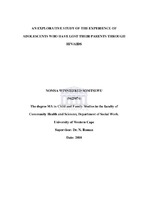An explorative study of the experience of adolescents who have lost their parents through HIV/AIDS
Abstract
AIDS related deaths of parents have resulted in children being orphaned, in large
numbers. Adolescence is a particularly vulnerable period in a child’s developmental life.It is a period charactarised by uncertainties, role confusion and identity crises. This stage becomes even more complex when adolescents loose their parents through AIDS. This thesis is an explorative study to understand the experience of adolescent who have lost their parents through HIV/AIDS. This study was theoretically located within a phenomenological framework. The participants were recruited from the foster care project of Ikamva Labantu in Gugulethu. The participants were adolescents aged from 14- 17 years old. They were purposively selected to participate in this study. The study was conducted within a qualitative research design, and underpinned by an interpretative framework. Data was collected by means of in-depth interviews with the aid of an interview guide, and observations. This study identified seven themes. Three themes share the experience prior to parental death and the four express the experience after parental death. The research findings led to the conclusion that adolescents struggle with a myriad challenges such as discrimination, stigmatisation, caring for siblings and having to deal with the death of parents often without the necessary support. The conclusions drawn and the recommendations made will contribute to knowledge that will support social workers and other professionals working with AIDS orphaned adolescents, in understanding their experiences.

